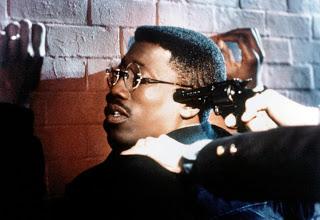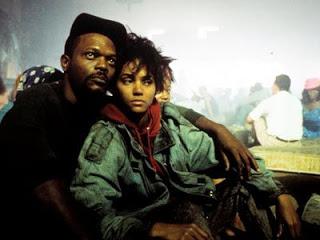
"There will be no penis between us!"
No one accused Spike Lee of subtlety, and Jungle Fever (1991) tackles its subject - interracial relationships - full bore. Full of Lee's probing anger and restless energy, it's an overwrought movie that doesn't land effectively.Architect Flipper Purify (Wesley Davis) falls for his new secretary Angie Tucci (Annabella Sciorra). Their fling raises everyone's ire: Flip's wife Drew (Lonette McKee) throws him out, while Angie's beaten by her father (Frank Vincent). They move into together, becoming social outcasts. Other plot lines involve Gator (Samuel L. Jackson), Flip's crackhead brother who pesters Flip and their parents (Ossie Davis and Ruby Dee) for money; and Paulie (John Turturro), Angie's ex, who flirts with Orin (Tyra Ferrell).
Jungle Fever has Lee's characteristic energy. Between Stevie Wonder's excellent score, Ernest Dickerson's expressive photography (sepia-toned in Harlem, washed out in the office, with long takes and swooping crane shots) and some jolts of unexpected humor. Compared to Do the Right Thing it's remarkably unnuanced; Flip and Angie's flirtation leads to a confrontation with police; Angie's father belts her. Lee evokes the then-recent case of Yusuf Hawkins, accused of flirting with a white girl and murdered, showing even modern society as less enlightened than we think.
Lee frames Jungle Fever as about sex, rather than romance. Flip views interracial attraction as curiosity, while Angie wishes to spite her family. The Italians are appalled, viewing Angie as defiled by Flip (and themselves, unmanned). Drew's friends argue for the inherent unfaithfulness of black men and "white bitches" that lead them astray, while arguing about skin complexion. This is edgy stuff, rarely discussed in mainstream Hollywood films, but repeated so often it seems like a lecture.

Unlike Do the Right Thing, many of Jungle Fever's subplots don't gel. Paulie's plot merely echoes Angie's own, without making new points. Meanwhile, Gator's storyline seems imported from another film. Samuel L. Jackson gives a powerful turn, alternately funny and pathetic, leading to a violent confrontation with his parents. Their big scene's raw and effective as anything here, but what has it to do with anything?
Wesley Snipes and Annabella Sciorra have enough depth (Snipes simmering resentment, Sciorra brassy humor) to make them a compelling couple. The deep supporting cast is mixed: Jackson and Ruby Dee sell their scenes, but Ossie Davis is uncharacteristically hammy. John Turturro is excellent, but Lonette McKee receives little depth. Anthony Quinn's hambone geezer and Tim Robbins' jerk boss make no impression. Lee gives himself a minor role, playing Flip's disapproving friend. Halle Berry and Queen Latifah have bit parts.
Spike Lee enjoys probing controversial content from all angles. Usually, this evenhandedness prevents his work from degenerating into polemic. But Jungle Fever covers too much ground, inserting perspectives that obfuscate rather than enlighten. For all its periodic power, it's a mess.

